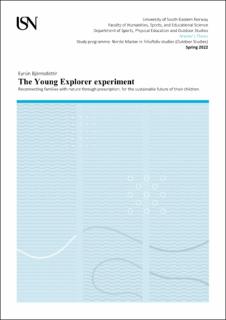The Young Explorer experiment
Master thesis
Permanent lenke
https://hdl.handle.net/11250/3009033Utgivelsesdato
2022Metadata
Vis full innførselSamlinger
Sammendrag
The importance of nature connection for children should not be disregarded. With industrialization and urbanization, people of modern societies worldwide are becoming disconnected from nature, influencing both their mental and physical well-being. The study aims to explore and understand the meaning of participation in prescribed familybased outdoor activities. The theoretical background is a pragmatic approach, the intraplay between theory and action. The study is inspired by the Deweyan ontological and epistemological framework and is based on John Dewey´s reflective thought and action model. Semi-structured interviews, a focus-group interview and participant journals were used to collect data and reflect on the experiment. The sample consisted of 6 Icelandic families from the capital area of Reykjavik. Data was collected and transcribed verbatim and an inductive coding method was used for analysis, resulting in three categories, nature as a motivator for outdoor activity, the parental ability for outdoor activity, and prescribed assignments as triggers for outdoor activity. Findings demonstrate that prescribed outdoor assignments positively affect families and nature connection. Participating families were content with the experiment. They claimed that the prescribed outdoor assignments triggered them with new ways to connect to nature through simple activities in the vicinity of their home. However, due to limited time for the study and a sample that was already very active outdoors, it was difficult to determine how prescribed assignments might change their behaviour in the long run. Therefore, further research needs to be done with a revised program, a larger sample, and a longitudinal research.
Keywords: Nature connection, parental role, experiment, outdoor prescription, behavioural change.
